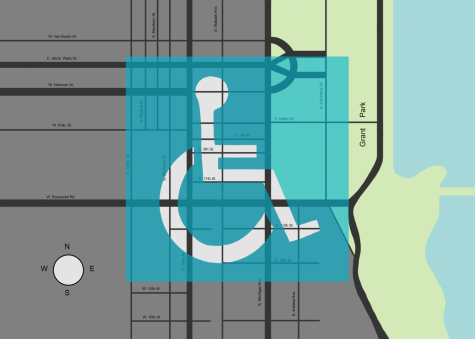From the library to laundry rooms: A guide to accessibility on campus
September 21, 2022

With the bustling South Loop serving as Columbia’s campus, being surrounded by tall, old buildings, and a loud environment can be intimidating for everyone regardless of their physical or neurological abilities. However, the Columbia community has resources that strive to accommodate each student’s needs.
Services for Students with Disabilities
The Services for Students with Disabilities office — or SSD — located at 623 S. Wabash Ave., provides individualized help and resources to students like extended time, class breaks, a reduced distraction environment, use of an interpreter or notetaker, braille, bigger text and more, said Danielle Hirschhorn, a coordinator at SSD.
Jeanne Kelly, director of SSD, said one common misconception new students have while transitioning from high school is that the college will already have all the information about a student’s disability and accommodations ready, when in reality they do not; it is up to the student to reach out to SSD for accommodations.
Kelly said the SSD office encourages students to advocate for themselves and reach out to their staff if they need accommodations.
“The more information we have from students specifically by coming into our office, the more we can advocate for them,” Kelly said.
According to the SSD office, approximately 9% of the Columbia student population has self-identified as having a disability. Over 98% of these students identify as having invisible disabilities and more than 50% have more than one disability.
Student Diversity and Inclusion
The Student Diversity and Inclusion office, also known as SDI, focuses on prioritizing diversity and inclusion through programming, student support, educational outreach and intentional community building.
Charee Mosby-Holloway, director of SDI, said their office has calmer lighting for students with sensory disorders, providing a space on campus that is “low impact.”
“Our students requested that we have things like fidget spinners available, so we were able to find money in the budget to make those things available,” Mosby-Holloway said.
Varying Visions
A new student-based organization, Varying Visions, serves as a safe space for students with all kinds of visible and invisible disabilities to showcase their work and talk about how their disability impacts their daily life and fuels their creativity. The group also discuss ways to make this marginalized, sometimes overlooked community more accepted and understood in society.
Varying Visions members post updates regularly on their Instagram. They also have a Discord server students can join, which can be found in a link in their Instagram biography.
“[We] hold a space safe for students with a wide range of conditions to meet and assist each other and also potentially discuss certain things the campus can do to improve accessibility,” said Maxwell Mootz, senior film major and Varying Visions co-president.
Columbia’s library
Another resource for students with disabilities is the on-campus library at 624 S. Michigan Ave. Jennifer Sauzer, head of access services and assessment at the library, said they have work stations set up that are wheelchair accessible with adjustable height, elevators on all floors and accessibility stations. These stations are able to accommodate both mobility devices and students who do not want to sit for extended periods. These resources are available on the first and second floors of the building.
“The library is really committed to meeting the moment, and first of all operating with a baseline where we have considered accessibility,” Sauzer said.
The University Center
Students with disabilities are also provided with amenities throughout campus housing.
Brooke Lopeman, executive director of the University Center, dubbed as the UC, 525 S. State St., said the building is widely accessible.
“From the time you enter the front doors, everything is wheelchair accessible, including the front doors of the building, elevators; even our laundry room has wheelchair accessible doors,” Lopeman said.
Specific housing units are equipped with a tap entry instead of the swiping card in traditional doors, Lopeman said.
The UC also offers resources like numbers in braille on each of the washers and dryers, as well as having art spaces, a meditation room and relaxation rooms.
In accordance with the Americans with Disabilities Act, housing units have roll-in showers with seats and grab bars, roll-up sinks, and convertible kitchen cabinets removed at the sinks for accessibility and pop-out drawers instead of swing-out, Lopeman said. In the case of fire alarms going off in the building, there are bed knockers for hearing impaired students and strobes for vision impaired students, she added.
Many of these accommodations can also be added and removed from units easily upon request.
Kelly said Columbia aims to continuously improve its efforts and relationships with students who have disabilities. She said this semester students can expect to see SSD office hosting pop-up tables with different themes at various buildings where students can stop and chat.







